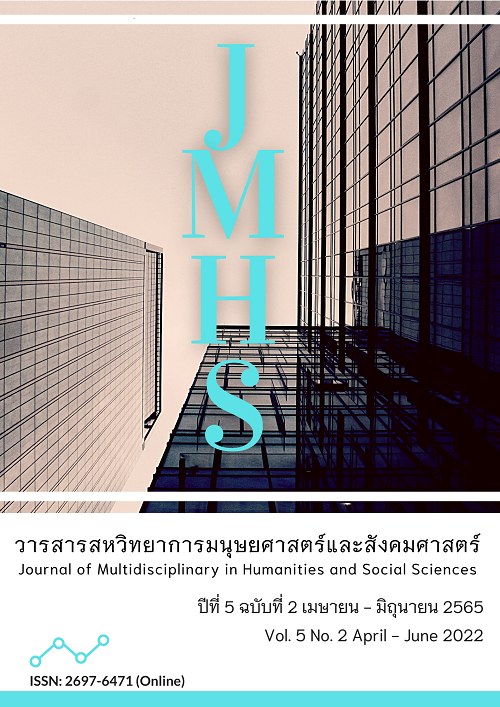Factor of Cultural Heritage Values that Effecting to Gastronomy Tourism Experience in Phuket Old Town Community
Main Article Content
Abstract
Phuket Province is a destination with potential in tourism resources and cultural heritage that represents the local identity and can create tourism experiences. This research aimed to study the level of opinion, relationship, and factor of cultural heritage values can affect to gastronomy tourism experiences. This was a quantitative research based on collected data from 400 Thai tourists. The statistics that were analyzed and tested the hypothesis were mean, standard deviation, Pearson’s correlation, and multiple regression. It was found that 1) the level of opinions on cultural heritage values and gastronomy tourism experiences were high; 2) the relationship was a positive correlation. If cultural heritage values increase, gastronomy tourism experience will increase too; and 3) there were five cultural heritage value factors that influenced gastronomy tourism experiences.
Article Details

This work is licensed under a Creative Commons Attribution-NonCommercial-NoDerivatives 4.0 International License.
Views and opinions appearing in the Journal it is the responsibility of the author of the article, and does not constitute the view and responsibility of the editorial team.
References
กระทรวงการท่องเที่ยวและกีฬา. (2564). สถิติจำนวนนักท่องเที่ยว. สืบค้นเมื่อ 15 พฤศจิกายน 2564,จาก http://mots.go.th/more_new_new.php?cid=630.
กฤตวิทย์ กฤตมโนรถ และ ศุภกร ดิษฐพันธ์. (2561). การท่องเที่ยวเชิงอาหารผ่านอัตลักษณ์อาหารทั้ง 4 ภูมิภาค. วารสารสถาบันวัฒนธรรมและศิลปะ มหาวิทยาลัยศรีนครินทรวิโรฒ, 20(2), 139-151.
ญาณภา บุญประกอบ และคณะ. (2560). อาหารพื้นถิ่นกับกลไกในการส่งเสริมการท่องเที่ยวเชิงสร้างสรรค์ กรณีศึกษากลุ่มชาติพันธุ์ลาวครั่ง จังหวัดชัยนาท. วารสารวิทยาลัยดุสิตธานี, 11(พิเศษ), 93-108.
ชัชพล ทรงสุนทรวงศ์ และ สันติธร ภูริภักดี. (2563). โมเดลคุณค่าประสบการณ์การท่องเที่ยวของนักท่องเที่ยวผู้สูงอายุชาวไทย. วารสารอิเล็กทรอนิกส์การเรียนรู้ทางไกลเชิงนวัตกรรม, 10(2), 189-207.
ณัฐพร ไข่มุกข์ และ อรอุษา สุวรรณประเทศ. (2563). จากภูมิปัญญาพื้นบ้านสู่สำรับอาหารเพื่อการท่องเที่ยว กรณีศึกษาชุมชนบ้านทุ่งหลวง อำเภอคีรีมาศ จังหวัดสุโขทัย และชุมชนบ้านวังวน อำเภอศรีสัชนาลัย จังหวัดสุโขทัย. วารสารการวิจัยเพื่อพัฒนาชุมชน, 13(1), 109-127.
นิมิต ซุ้นสั้น และ อุมาภรณ์ สมกาย. (2564) ประสบการณ์การท่องเที่ยวเชิงอาหารที่ส่งผลต่อการแบ่งปัน ประสบการณ์: การศึกษาตัวแปรส่งผ่านและตัวแปรกำกับ. จุฬาลงกรณ์ธุรกิจปริทัศน์, 43(3), 40-63.
นัขนลิน อินทุพัฒน์. (2563). ศักยภาพของชุมชนเพื่อการจัดการการท่องเที่ยวโดยชุมชน: กรณีศึกษาชุมชนอ่างเก็บน้ำลำพอก จังหวัดสุรินทร์, วารสารมนุษศาสตร์และสังคมศาสตร์ มหาวิทยาลัยมหาสารคาม, 39(2), 61-73.
พนิต มงคลธรรมรัตนะ. (2561). กฎหมายส่งเสริมและรักษามรดกภูมิปัญญาทางวัฒนธรรม: การพัฒนาและอุปสรรคของประเทศไทย. วารสารนิติศาสตร์ มหาวิทยาลัยอัสสัมชัญ, 9(1), 69-69.
พระครูสังฆรักษ์ทรงพรรณ ชยทตโต. (2563). กระบวนการสร้างภูมิคุ้มกันมรดกทางวัฒนธรรมของชุมชนตลาดน้ำในจังหวัดราชบุรี. วารสารครุศาสตร์ปริทรรศน์ คณะครุศาสตร์ มหาวิทยาลัยมหาจุฬาลงกรณราชวิทยาลัย, 8(2), 16-28.
พรรณี สวนเพลง และคณะ. (2559). การท่องเที่ยวเชิงอาหาร. รายงานภาวะเศรษฐกิจท่องเที่ยว, 4(2), 38-45.
ภูริ ชุณห์ขจร. (2560). ยุทธศาสตร์เพื่อส่งเสริมการท่องเที่ยวเชิงอาหารสำหรับนักท่องเที่ยวชาวต่างชาติ. วารสารวิทยาลัยดุสิตธานี, 11(ฉบับพิเศษ), 321-332.
สาธิดา สกุลรัตนกุลชัย และ กรรณิกา สงวนสินธุกุล. (2563). การศึกษาเพื่อพัฒนาการท่องเที่ยวเชิงอาหารในพื้นที่ที่มีบริบทต่างกัน กรณีศึกษาจังหวัดนครปฐม. กองทุนวิจัยมหาวิทยาลัยธรรมศาสตร์: มหาวิทยาลัยธรรมศาสตร์.
สาธิดา สกุลรัตนกุลชัย และ กรรณิกา สงวนสินธุกุล. (2563). การศึกษาเพื่อพัฒนาการท่องเที่ยวเชิงอาหารในพื้นที่ที่มีบริบทต่างกัน กรณีศึกษาจังหวัดนครปฐม. วารสารวิจัยและสาระสถาปัตยกรรม/การผังเมือง, 18(1), 1-18.
Azavedo, M. (2019). Why Do Tourists Attend Cooking Classes? Some Indications from Thailand. Academic Journal of Economic Studies, 5(4), 44-51.
Chaigasem, T., & Jecan, M. (2021). A Conceptual Framework of Gastronomy Tourism Development Focusing on Cultural Heritage Values in Maha Sarakham Province. Journal of Psychology and Education, 58(1), 5828-5841.
Cochran, W. G. (1953). Sampling Techniques. New York: John Wiley & Sons.
Fang, W. G., & Ariffin, A. A. M. (2021). Cultural Heritage Tourism: Determinants of Behavioral Intention to Visit a Historical City from Experiential Perspectives. Journal of Tourism, Hospitality and Environment, 6(22), 1-10.
George, D., & Mallery, P. (2003). SPSS for Windows Step by Step: A Simple Guide and Reference. (4th ed.). Boston: Allyn & Bacon.
Georghe, G. et al, (2014). Gastronomy Tourism a New Trend for Contemporary Tourism. Cactus Tourism Journal, 9(1), 12-21.
Greg, R. (2017). The Role of Gastronomy in Tourism Development. Proceeding of the 4th Congress of Noble House, 2017, 1151-1159.
Hussain, Z., Lema, J., & Agrusa, J. (2012). Enhancing the cultural tourism experience through gastronomy in the Maldives. Journal of Tourism Challenges and Trends, 5(2), 71-84.
Kim, S. et al. (2019). Extraordinary or Ordinary: Food Tourism Motivations of Japanese Domestic Noodle Tourists. Tourism Management Perspective Journal, 29, 176-186.
Kim, Y.G. et al. (2012). Construction and Validation of a Scale to Measure Tourist Motivation to Consume Local Food. Tourism Management Journal, 33(6), 1458-1467.
Lunchaprasith, T. (2018). The Relationship between Gastronomy and Community Development: A Case Study of Culinary Experiences Offered in Bang Nampheung Floating Market Prapadang Samut Prakarn, Thailand. Veridian E-Journal Silpakorn University, 11(4), 79-93.
Saurabh, A., Sangeeta D., & Lomte, D. M. (2020). Gastronomy Tourism: Exploring Local Culture Through Food in The City of Lucknow. Journal of Critical Reviews, 7(14), 1007-1015.
Solmaz, U., Akmeseb, H., Gunesc, E., & Aras, S. (2016). Gastronomy in Tourism. Procedia Economic and Finance, 39, 725-729,
Tudorache, P. (2016). The Important of Intangible Cultural Heritage in The Economy. Pecedia Economic and Finance Journal, 39, 731-736.
Walker, K., & Moscardo, G. (2014). Encouraging Sustainability Beyond the Tourist Experience: Ecotourism Interpretation and Values. Journal of Sustainable Tourism, 22(8), 1175-1196.


